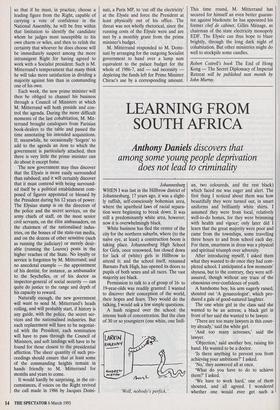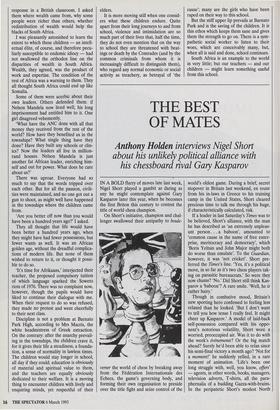LEARNING FROM SOUTH AFRICA
Anthony Daniels discovers that
among some young people deprivation does not lead to criminality
Johannesburg WHEN I was last in the Hillbrow district of Johannesburg, 17 years ago, it was a slight- ly raffish, self-consciously bohemian area, where the apartheid laws of racial separa- tion were beginning to break down. It was still a predominantly white area, however; now it is overwhelmingly black.
White business has fled the centre of the city for the northern suburbs, where (to the naïve eye, at least) a construction boom is taking place. Johannesburg High School for Girls, once renowned, has closed down for lack of (white) girls in Hillbrow to attend it; and the school itself, renamed Barnato Park High, has opened its doors to pupils of both sexes and all races. The vast majority are black.
Permission to talk to a of group of 16- to 19-year-olds was readily granted: I wanted to discover their conception of the world, their hopes and fears. They would do the talking, I would ask a few simple questions.
A hush reigned over the school: the intense hush of concentration. But the class of 30 or so youngsters (one white, one Indi- 'Well, nobody's perfick.' an, two coloureds, and the rest black) which faced me was eager and alert. The first thing I noticed about them was how beautifully they were turned out, in smart uniforms and brilliantly white shirts. I assumed they were from local, relatively well-to-do homes, for they were brimming with health and vigour; only later did I learn that the great majority were poor and came from the townships, some travelling three hours to and from school each day. For them, smartness in dress was a physical and spiritual triumph over adversity.
After introducing myself, I asked them what they wanted to do once they had com- pleted school. I anticipated a few moments' shyness, but to the contrary, they were self- assured, though without any trace of the obnoxious over-confidence of youth.
A handsome boy, his arm eagerly raised, shouted out 'A gynaecologist', which pro- duced a gale of good-natured laughter.
The one white girl in the class said she wanted to be an actress; a black girl in front of her said she wanted to be lawyer.
'There are too many lawyers in this coun- try already,' said the white girl.
'And too many actresses,' said the lawyer.
'Objection,' said another boy, raising his hand. He wanted to be a doctor.
'Is there anything to prevent you from achieving your ambitions?' I asked.
`No,' they answered all at once.
'What do you have to do to achieve them?' I asked.
'We have to work hard,' one of them shouted, and all agreed. I wondered whether one would ever get such a response in a British classroom. I asked them where wealth came from, why some people were richer than others, whether redistribution of wealth would help the blacks of South Africa.
I was pleasantly astonished to learn the extent to which these children — an intell- ectual elite, of course, and therefore pecu- liarly susceptible to endemic idiocy — had not swallowed the orthodox line on the disparities of wealth in South Africa. Wealth, they agreed, was the product of work and expertise. The condition of the rest of Africa was a warning to them. They all thought South Africa could end up like Somalia.
Some of them were acerbic about their own leaders. Others defended them: if Nelson Mandela now lived well, his long imprisonment had entitled him to it. One girl disagreed vehemently.
'What have the ANC done with all that money they received from the rest of the world? How have they benefited us in the townships? What single thing have they done? Have they built any schools or clin- ics? Now the leaders all live in million- rand houses. Nelson Mandela is just another fat African leader, enriching him- self and out for power. What does he care about us?'
There was uproar. Everyone had so much to say that the words tripped over each other. But for all the passion, civili- ties were maintained, and no one got out a gun to shoot, as might well have happened in the townships where the children came from.
'Are you better off now than you would have been a hundred years ago?' I asked.
They all thought that life would have been better a hundred years ago, when they might have had fewer possessions, but fewer wants as well. It was an African golden age, without the dreadful complica- tions of modern life. But none of them wished to return to it, or thought it possi- ble to do so.
'It's time for Afrikaans,' interjected their teacher, the proposed compulsory tuition of which language sparked the Soweto riots of 1976. There was no complaint now, however, though the pupils would have liked to continue their dialogue with me. When their request to do so was refused, they made no protest and went cheerfully to their next class.
Discipline is not a problem at Barnato Park High, according to Mrs Macris, the white headmistress of Greek extraction. On the contrary: after the anarchy prevail- ing in the townships, the children crave it, for it gives their life a steadiness, a founda- tion, a sense of normality in lawless times. The children would stay longer in school, all day if they could; education is obviously of material and spiritual value to them, and the teachers are equally obviously dedicated to their welfare. It is a moving thing to encounter children with lively and enquiring minds, yet respectful of their elders.
It is more moving still when one consid- ers what these children endure. Quite apart from their long journeys to and from school, violence and intimidation are so much part of their lives that, half the time, they do not even mention that on the way to school they are threatened with beat- ings or death by the Comrades (and by the common criminals from whom it is increasingly difficult to distinguish them), who regard any normal economic or social activity as treachery, as betrayal of 'the cause'; many are the girls who have been raped on their way to this school.
But the stiff upper lip prevails at Barnato Park and is the saving of the children. It is this ethos which keeps them sane and gives them the strength to go on. There is a sym- pathetic social worker to listen to their woes, which are conceivably many, but, when all is said and done, school continues.
South Africa is an example to the world in very little; but our teachers — and our children — might learn something useful from this school.



















































 Previous page
Previous page